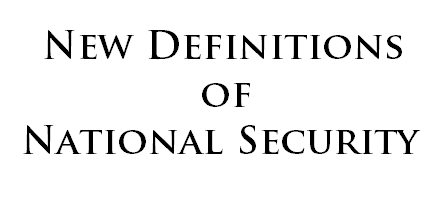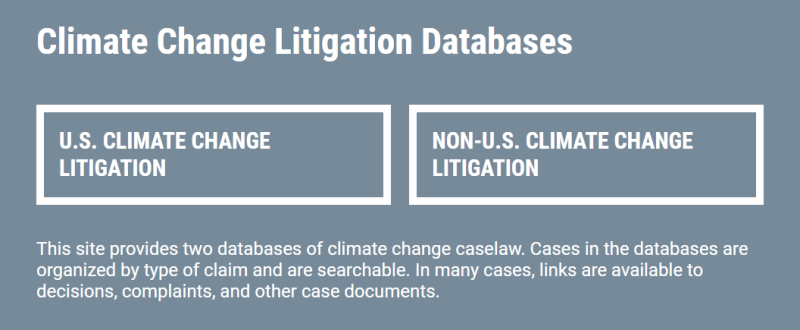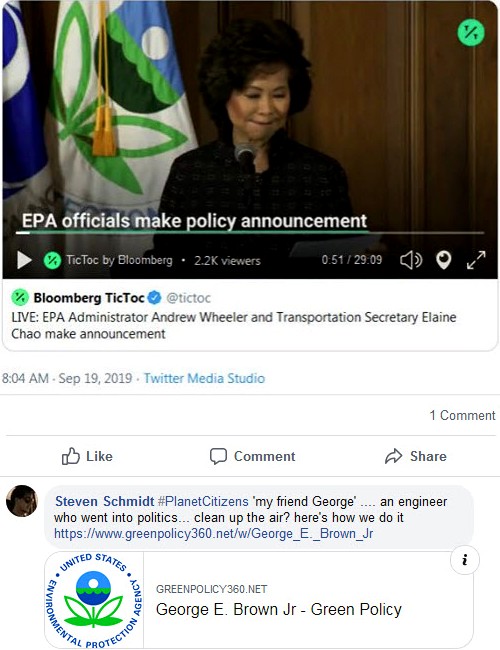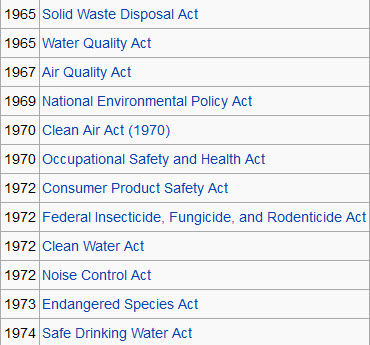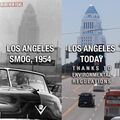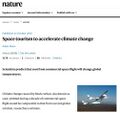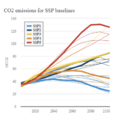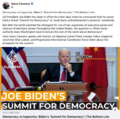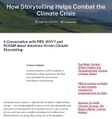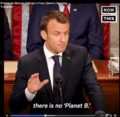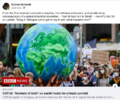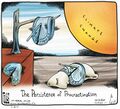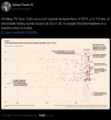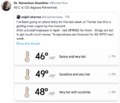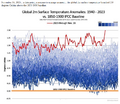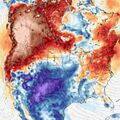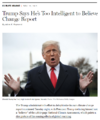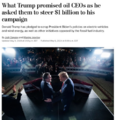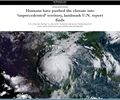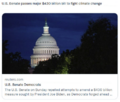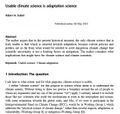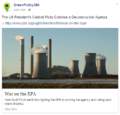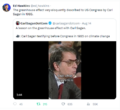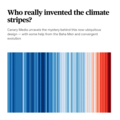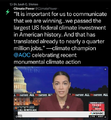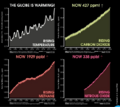Category:Environmental Laws
<addthis />
- New Vision for a Connected World
- National & Global Security, Indivisible
New Definitions of National Security @GreenPolicy360
Environmental Security, National Security
Climate Change Laws / Litigation Database
Law & Environmental Protection
The Future of International Environmental Governance
Draft Global Pact for the Environment
Climate Change, the Courts, and the Paris Agreement
Experts have highlighted a clear legal challenge: international environment law is fragmented in many conventions and international declarations...
The Global Pact for the Environment will be the first international legally binding document, gathering and harmonizing all environmental laws in one single document. Its objective is to be an essential tool for governments to help them implementing environmental rules and principles in their own country.
- ······················································································
Environmental Security & "Thin Blue"
New Definitions of National Security @StrategicDemands
Thin Blue Layer protecting the home planet
·······································································
Environmental Law / United States
The recent U.S. elections have produced a 'turn-back-the-clock caucus' in the US Congress. The resulting efforts to roll back environmental laws passed with success over the yrs will present a challenge to profound green progress. We should consider again the beginning of the green era in the U.S. and successive accomplishments in law and practice that clearly deserve to be built upon, not to be dismantled by retro-policies.
US Environmental Laws Rollback Tracker
One Environmental Law Rollback
"This will be the biggest loss of clean water protection the country has ever seen," said Blan Holman, an attorney with the Southern Environmental Law Center.
The new measure will roll back Obama-era "Waters of the United States" (WOTUS) regulations aimed at ensuring wetlands and streams are protected under the 1972 Clean Water Act, which the Trump Environmental Protection Agency has repeatedly targeted.
"This puts drinking water for millions of Americans at risk of contamination from unregulated pollution," said Holman. "This is not just undoing the Obama rule. This is stripping away protections that were put in place in the '70s and '80s that Americans have relied on for their health."
As the New York Times reported in January 2020, the Trump rule "will remove federal protections from more than half the nation's wetlands, and hundreds of thousands of small waterways."
"His administration had completed the first step of [the WOTUS regulation's] demise in September with the rule's repeal," the Times reported. "His replacement will complete the process, not only rolling back 2015 rules that guaranteed protections under the 1972 Clean Water Act to certain wetlands and streams that run intermittently or run temporarily underground, but also relieves landowners of the need to seek permits that the Environmental Protection Agency had considered on a case-by-case basis before the Obama rule."
Trump and EPA chief Andrew Wheeler, a former coal lobbyist, touted the rule at the American Farm Bureau Federation's annual convention in Texas.
·········
US acts to unravel environmental protections as president is impeached and another war is imminent
Trump administration attacks the 'Magna Carta' of US Environmental Protection, the NEPA Act
Administration officials say they aim to "modernize and clarify" the 50-year-old National Environmental Policy Act, NEPA.
National Environmental Policy Act
NEPA is often said to be the Magna Carta of the environmental movement...
·········
Continuing its deep cuts and rollbacks of environmental protections and safeguards
Today Sept. 19, the Trump administration rolls back clean air and auto mileage standards
Wife of Senator Mitch McConnell delivers the news
Rep. George E. Brown and the generation who envisioned and created the first auto emission, clean air standards and foundational US state and national environmental standards are having their work set aside by the Trump administration...
Trump's Losing Record on Energy and the Environment
Trump's Lack of Vision
Pushing Fossil Fuels, Emissions and Consequences
○
Local Clean Water News / Politics
Fox News US ridicules local efforts to cut back on single-use plastic un-recycled household items
As US Clean Water Act Is Undercut by Fox-supported US president, a first study of 'Tampa Bay Plastic Pollution' reveals '4 Billion Microplastic Particles'
·········
The modern environmental movement
... Environmental protection to build on
○
Environmental Law / Global / International
Californian and US models of environmental legislation go international
List of International Environmental Agreements
○
Montreal Protocol, the beginning of international environmental law
* https://en.wikipedia.org/wiki/Montreal_Protocol
Due to its widespread adoption and implementation it has been hailed as an example of exceptional international co-operation, with Kofi Annan quoted as saying that "perhaps the single most successful international agreement to date has been the Montreal Protocol" ... When comparing this very success story with attempts to establish an international policy on the Earth's climate or atomic energy, the entire process from a problem formulation to a global acceptance supported by a legal framework took less than a quarter of a single human generation live span.
Among the treaty's accomplishments are: The Montreal Protocol was the first international treaty to address a global environmental regulatory challenge; the first to embrace the "precautionary principle" in its design for science-based policymaking; the first treaty where independent experts on atmospheric science, environmental impacts, chemical technology, and economics, reported directly to Parties, without edit or censorship, functioning under norms of professionalism, peer review, and respect; the first to provide for national differences in responsibility and financial capacity to respond by establishing a multilateral fund for technology transfer; the first MEA with stringent reporting, trade, and binding chemical phase-out obligations for both developed and developing countries; and, the first treaty with a financial mechanism managed democratically by an Executive Board with equal representation by developed and developing countries.
····························································
····························································
The New Environmental Regulation
MIT Press: Environmental regulation in the United States has succeeded, to a certain extent, in solving the problems it was designed to address; air, water, and land, are indisputably cleaner and in better condition than they would be without the environmental controls put in place since 1970. But Daniel Fiorino argues in The New Environmental Regulation that—given recent environmental, economic, and social changes—it is time for a new, more effective model of environmental problem solving. Fiorino provides a comprehensive but concise overview of U.S. environmental regulation—its history, its rationale, and its application-—and offers recommendations for a more collaborative, flexible, and performance-based alternative.
“This is one of the most important books on U.S. environmental policy to appear in the past twenty years. Fiorino offers a convincing analysis of its strengths and weaknesses and points the way towards a new style of regulation appropriate to the challenges of the twenty-first century.”
○
Legal Issues Confronting Environmental Protection Laws
- Selected Issues
Investor-State Dispute Settlement / ISDS
Investor-state dispute settlement (ISDS) is an instrument of public international law, that grants an investor the right to use dispute settlement proceedings against a foreign government. Provisions for ISDS are contained in a number of bilateral investment treaties, in certain international trade treaties, such as the North American Free Trade Agreement (Chapter 11) and the Trans-Pacific Partnership (Chapters 9 and 28). ISDS is also found in international investment agreements, such as the Energy Charter Treaty. If an investor from one country (the "Home State") invests in another country (the "Host State"), both of which have agreed to ISDS, and the Host State violates the rights granted to the investor under public international law, then that investor may bring the matter before an arbitral tribunal. So, for example, if after an investor has acquired the right to sell cigarettes in a Host State, the Home State imposes a heavy tax on cigarettes (because they are carcinogenic), then the investor sue for his losses: This is a great protection for corporate investment, and a recognition of the primacy of corporate profits.
"If you wanted to convince the public that international trade agreements are a way to let multinational companies get rich at the expense of ordinary people, this is what you would do: give foreign firms a special right to apply to a secretive tribunal of highly paid corporate lawyers for compensation whenever a government passes a law to, say, discourage smoking, protect the environment or prevent a nuclear catastrophe. Yet that is precisely what thousands of trade and investment treaties over the past half century have done, through a process known as 'investor-state dispute settlement', or ISDS."
Note: In early January 2016, the TransCanada corporation announced it would initiate an ISDS claim under NAFTA against the United States, seeking $15 billion in damages and calling the denial of a permit for Keystone XL "arbitrary and unjustified."
Read More:
(SJS: The legal provisions and politics of many trade agreements act to undercut and 'water down' environmental laws. The on-the-ground reality of many provisions within existing trade agreements that act against environmental law protections remain one of the foremost challenges for greens and the environmental movement. One necessity among many is to point out the problems with secret administrative rulings of trade treaties, the "ISDS" sections in the treaties, and reform/rewrite these sections to enable worker/environmental protections across economic systems and national borders. This is a "blue-green", labor-environment alliance, that needs to be continually developed for steady progress, locally and globally.)
○
General Agreement on Tariffs (see 'Uruguay Round') - GATT
International Centre for Settlement of Investment Disputes
International Investment Agreement - https://en.m.wikipedia.org/wiki/International_investment_agreement
North American Free Trade Agreement (NAFTA) - https://en.m.wikipedia.org/wiki/North_American_Free_Trade_Agreement
Tran-Pacific Partnership (TPP) - https://en.m.wikipedia.org/wiki/International_investment_agreement
Transatlantic Trade and Investment Partnership (TTIP) - https://en.m.wikipedia.org/wiki/Transatlantic_Trade_and_Investment_Partnership
United Nations Commission on International Trade Law
World Trade Organization - https://www.wto.org/
____________________________________________
Personal Recollections
Siterunner / SJS: Reflecting about the 1992 US presidential campaign when I served in a number of roles as a Sr advisor to Jerry Brown.
One memory comes into view as the subject of environmental laws is discussed here at GreenPolicy. This is the NAFTA controversy, the treaty that was being debated between our campaign and the Clinton campaign. We opposed the treaty as it was negotiated, the Clinton campaign and much of the 'new' Democratic party as reflected in the Democratic Leadership Council (DLC) supported it.
In the presidential debates at one point I was preparing briefing materials for Governor Brown and we were focusing on what we called the 'watering down' of worker and environmental law protections. We saw our US environmental law successes in the 60s, 70s and into the 80s, as a 25 year slate as a foundation of environmental protection laws. Many had originated in California and in Congress with California representatives) and these legal, env regulations had been hard won over the years. We aspired for them to become models for other states and countries, a framework for international progress. The treaties, however, were sliding in another way. What we were saying is that, with the passage of these treaties as written, there would be 'a race to the bottom' and trade treaties like NAFTA and GATT were costly in ways that would set back progress on multiple fronts, from jobs to environmental protection and security. Why? We began by pointing out provisions that allowed 'secret tribunals' to arbitrate and decide on disputes over 'non-tariff trade barriers', i.e, worker and environmental protection laws.
Our position resonated and we found support, but as we did we also found that there would be another anti-NAFTA candidates, one with many charts and quotable lines. The history of the 1992 campaign illustrated how the Perot campaign (which eventually received 19% of the general election vote and was instrumental in the election of Bill Clinton, who received 43% of the vote) took up the Brown campaign motto and some themes, including opposition to the NAFTA agreement, but Perot did not focus on the extra-administrative authority contained in Investor-state dispute mechanisms and so-called non-tariff trade barriers as applied to a host of environmental laws. The Brown campaign criticism on this front were prescient, as history continues to demonstrate. Our criticisms helped to produce additional negotiations, yet secret administrative tribunals for dispute resolution continue on.
The recent action by a Canadian corporation to sue the US for $15 billion in 'damages' over the US rejection of the XL gas pipeline based upon study and evidence of environmental and climate damage, is just one example of multiple instances where tribunals actions are a front- and back-end threat to progress on worker/environmental law that benefits the commons and, in the case of climate policy, is essential for global and national security.
The TransCanada lawsuit highlights the environmental issues with secret tribunals and current trade treaty provisions
January 2016
DemocracyNow interview with Lori Wallach, director of Public Citizen's Global Trade Watch, the author of "The Rise and Fall of Fast Track Trade Authority"
LORI WALLACH: Well, what it boils down to is a foreign corporation deciding that the US taxpayers ought to give them $15 billion because they don't like the outcome of our government decision that this pipeline was bad for our country and bad for the environment. And where they're going to get this money extracted from us is an extrajudicial - not US court, not US law - forum: the investor-state tribunal allowed under NAFTA. And the US has faced about a dozen of these attacks under NAFTA, all from Canada, but we have 50 agreements that have this outrageous system. Hardly any of those countries with those agreements actually have investors here. So, up to now, we haven't lost one of these cases; however, the Trans-Pacific Partnership, overnight, if implemented, would double our liability. Right now, 50 agreements, about 9,000 companies are cross-registered from one of those countries that we have the agreement with operating in the US to attack our laws in these tribunals. Overnight, the TPP would give 9,500 more companies - big multinationals from Japan, in banking, in manufacturing, mining firms from Australia - the right to do this. So this case, hopefully, is like the canary in the coal mine letting us know what we'd be getting into.
AMY GOODMAN: In May, President Obama delivered a speech at Nike in Beaverton, Oregon, where he defended the pending Trans-Pacific Partnership trade deal.
- PRESIDENT BARACK OBAMA: Critics warn that parts of this deal would undermine American regulation, food safety, worker safety, even financial regulations. This - they're making this stuff up. This is just not true. No trade agreement is going to force us to change our laws.
AMY GOODMAN: President Obama also said the TPP improves on NAFTA.
- PRESIDENT BARACK OBAMA: When you ask folks, specifically, "What do you oppose about this trade deal?" they just say, "NAFTA." NAFTA was passed 20 years ago. That was a different agreement. And in fact, this agreement fixes some of what was wrong with NAFTA by making labor and environmental provisions actually enforceable. I was just getting out of law school when NAFTA got passed.
AMY GOODMAN: Lori Wallach, your response to President Obama? He was speaking at Nike headquarters.
LORI WALLACH: Well, first of all, the making stuff up comment is going to have to get shelved, because not only is this attack by TransCanada on our domestic, democratic government decision not to have a pipeline the exact kind of case he said couldn't possibly happen - well, it just did, $15 billion being demanded by a - from a tribunal of three private sector attorneys, because this investor-state system, it's not judges. There are no conflict-of-interest or impartiality rules. These are folks who rotate between one day suing a government for a corporation and the next day being the judge. And they all hear cases amongst themselves. They call themselves "the club." And there's no outside appeal, and there's no limit on how much money they can order a government to pay. And if a government doesn't pay, by the way, the company has the right to seize government assets - seize government assets - to extract our tax dollars. So, number one, this case is exactly the kind of case President Obama said folks were making things up when they were worried about this. Well, now it's happened.
But this follows one month after the US Congress, because the WTO threatened billions in trade sanctions, gutted another consumer law. Hate to tell folks, if they didn't notice in the grocery store, but those customer meat - the country-of-origin labels we all use to figure out where our meat comes from, the WTO said we couldn't have those anymore. And so, Congress, at the face of these sanctions, said, "Oh, better get rid of that law." So, two examples, live and real, compared to what President Obama promised.
But more broadly about the TPP, here's the thing folks need to know. The actual language that TransCanada is using in this case, because they filed a brief, is the same language that, word for word, is replicated in TPP. So there are bells and whistles that have been changed between the investor-state language in NAFTA and TPP. In many ways, actually, TPP expands investor-state. It allows more kinds of challenges. Hell, it even allows challenges of government contracts for foreign companies' concessions on natural resources in foreign land. That was not in NAFTA. However, the actual claims being made by TransCanada, that language is word for word in the TPP. And you can see the analysis of that on our website, TradeWatch.org. You can look at the text now and use our analysis as basically a guided tour.
AMY GOODMAN: Lori, can you explain why they're asking $15 billion?
LORI WALLACH: So, this is a question a lot of folks asked me yesterday: "Well, wait a minute, this is supposed to" - everyone who's read the newspaper. "This is a $3 billion pipeline. How the heck can they be asking for $15 billion from us taxpayers?" And the answer is, under the outrageous investor-state system, not only can a foreign corporation get all these special rights - go around our courts, go around our laws and demand compensation - but they don't just get money for what they've spent on a project, they get to get compensated for expected future profits. Yep, they are calculating - and the brief goes through this - what they think they would have made in the future for the lifetime of the pipeline had it been allowed. And that's what we taxpayers are supposed to give them, because we had a democratic decision of our government that their commercial project wasn't in the national interest. That's the $15 billion.
AMY GOODMAN: Can you talk about how trade rules have affected how countries can deal with climate change? Like in, what, 2014, the US launched a WTO challenge against India's solar incentives.
LORI WALLACH: So, there's been really terrific work done on this by Sierra Club, NRDC, 350.org. If you go to their websites, for instance, Sierra Club has a terrific report that goes systematically through all the ways that our trade rules have undermined the efforts both to counter climate chaos, but also some of the adaptations, the efficiencies in energy policy we'd like to take on. And the overarching sum of it is, there are three problems.
One problem is, once we have a trade agreement with a country, we're no longer allowed to stop exports of, for instance, liquid natural gas. It's just deemed mandatory that we continue to send out energy. So, to the extent part of the answer to the climate disaster is we need to keep some carbon-based fuels not being processed and shipped around, we lose the right, as a policy, to do that. It's considered zero quota. We're not allowed to limit trade.
Number two, the nontrade regulatory limits in all these trade agreements - because, you know, the rule is, every country has to change its domestic laws to meet all these nontrade rules. TPP has got 30 chapters. Only six have to do with trade. There's a whole chapter on services, and it covers energy services. For instance, it does not allow you, in your policies, to discriminate between how you regulate, say, fossil fuels versus wind or solar. If it's fuel, it's fuel. And there's a whole set of specific constraints around those kind of energy and conservation policies.
And then, the third thing it does is it limits the kind of procurement policies you can have. So, typically, the government is the cutting edge in using our tax dollars when they're buying things for government to set up a market. So, you know, the car efficiency standards, fuel efficiency standards, we all know there's CAFE standards in our cars when we buy them. That started as a government program for the government fleet, so that the companies had a market to try and make efficient cars. So, right now, for instance, we have something called renewable portfolio standards, where when the government buys energy, a certain percentage has to be from renewable sources. Those kind of conditionalities are limited in the procurement chapter of an agreement like the TPP. So, basically, it hits, for the fuel industry - that's why they love it - on all grounds, in handcuffing governments with their policy options.
○
Subcategories
This category has the following 34 subcategories, out of 34 total.
Pages in category "Environmental Laws"
The following 115 pages are in this category, out of 115 total.
B
C
- California Global Warming Solutions Act
- Campaign Finance System Reform
- Carbon Brief
- Climate Change - Global Warming Keyword-Terms
- Climate Change Denier Talking Points -- and Rebuttals
- Climate Change Summit Paris
- Climate Desk
- Climate Law Blog @Columbia Law School
- Climate migration
- Climate News
- Climate News Events Archive ... 1970 to Today
- Climate Plans Enforcement - Resources
- Climate Problems, Climate Solutions
- Convention on the International Trade in Endangered Species of Wild Flora and Fauna
- Copernicus EU
E
- Each of us can make a positive difference
- Earth and Space, Politics
- Earth Day 2020
- Earth Day Memories on the 50th Anniversary
- Earth Day Summit - April 22 2021
- Earthrise
- EarthTime
- Eco-economic Decoupling
- Eco-nomics
- Election System Reform
- Environmental agreements
- Environmental Law, Rollbacks under Trump 2016-20
- Environmental movement
- Environmental protection
- Environmental Protection Agency
- Environmental Rules Rolled Back
- Environmental Studies Online
- EOS eco Operating System
- ESA Living Planet Announcement - May 2022
- Ethics and Climate Change
- European Union Green Deal - Fit for 55
- ExxonMobil and US House Science Committee v US Attorneys General and Environmental Groups
G
- Generation Green
- George E. Brown Jr
- Glasgow Climate Summit - Pledges, Promises, Declarations - What's Next Up
- Global Climate Action Summit
- Going Green
- Going Green: Texas v. Pennsylvania
- Google Earth
- Google Earth Timelapse
- Governor Jerry Brown
- Green Bank in Maryland - and More
- Green Best Practices
- Green Education
- Green Party
- Green Policy domains
- Green Politics 360
- Green Politics with GreenPolicy360
- Green Stories of the Day
- Green Stories of the Day - GreenPolicy360 Archive
- GreenAction
- Greening Our Blue Planet
- GreenLinks
- GreenPolicy360 Archive Highlights 2013
- GreenPolicy360 Archive Highlights 2014
- GreenPolicy360 Archive Highlights 2015
- GreenPolicy360 Archive Highlights 2016
- GreenPolicy360 Archive Highlights 2017
- GreenPolicy360 Archive Highlights 2018
- GreenPolicy360 Archive Highlights 2019
- GreenPolicy360 Archive Highlights 2020
- GreenPolicy360 Archive Highlights 2023
- GreenPolicy360 Highlights
- GTN GreenLinks Trending News
I
O
P
R
Media in category "Environmental Laws"
The following 140 files are in this category, out of 757 total.
(previous page) (next page)- Shell lawsuit Feb 2023.png 768 × 534; 229 KB
- Shifting Baseline Syndrome - threats to ecosystems biodiversity.png 431 × 534; 322 KB
- Shifting Baselines 2.jpg 600 × 600; 140 KB
- Short Circuiting Policy - by Leah Stokes.jpg 595 × 423; 94 KB
- Shrinking earth.jpg 762 × 600; 167 KB
- Shrinking the Earth, The Rise and Decline of Natural Abundance.jpg 180 × 274; 10 KB
- Slash emission now or face climate disaster.jpg 800 × 579; 94 KB
- Small Is Beautiful 1973.jpg 257 × 388; 17 KB
- SMOG be gone.jpg 700 × 700; 78 KB
- SMOG in the Los Angeles basin.png 800 × 386; 413 KB
- Solar panel price - 1976-2019.png 596 × 612; 92 KB
- SolarAqua Grid 2021.jpg 640 × 331; 116 KB
- Solving our climate crisis a national townhall-dec3,2018.jpg 640 × 360; 55 KB
- Space Tourism and emission-climate questions - July 20, 2021.jpg 501 × 356; 84 KB
- Speed and Scale Action Plan.png 550 × 867; 132 KB
- Speed and Scale Poster.png 490 × 772; 101 KB
- SSP Baselines-projections 2018-2100.png 393 × 406; 42 KB
- State of NASA - June 2, 2021 - by Bill Nelson.jpg 617 × 184; 50 KB
- State of the paris agreement nov2019.jpg 800 × 570; 178 KB
- Stephen Hawking Genius on PBS 1.jpg 800 × 474; 77 KB
- Stephen Hawking-Genius-2016.jpg 250 × 339; 27 KB
- Stephen-hawking-photo courtesy of pbs.jpg 800 × 533; 75 KB
- Steven J Schmidt, May 2023.png 363 × 484; 383 KB
- Story telling and science education.png 515 × 480; 171 KB
- StratDem Strategic Demands.png 768 × 1,024; 626 KB
- Strike - Sept 20.jpg 754 × 754; 44 KB
- SunriseBmore March 1, 2021.jpg 593 × 622; 187 KB
- Supreme Court decision on GHG emission cost metric - May 2022.png 640 × 442; 419 KB
- Surviving Victory - Liberty at Risk.jpg 448 × 433; 63 KB
- Telling stories of solutions for the climate crisis.jpg 600 × 640; 121 KB
- Temperature - SST World via Climate Change Institute - 2023 chart.png 800 × 509; 144 KB
- Temperature World - chart via Climate Change Institute.jpg 800 × 509; 67 KB
- Temperatures New Normal is Not Normal.jpg 582 × 461; 56 KB
- The Climate Dictionary - as of 2023.png 600 × 727; 200 KB
- The New Climate War - Irish Times review 2021.jpg 792 × 2,048; 373 KB
- The Original Mission Statement of NASA.png 787 × 166; 14 KB
- The Questionnaire.png 800 × 344; 147 KB
- The Rainforest Canopy, the Richest Biosphere on Earth.png 745 × 757; 730 KB
- The U.S. Role in the World ... Congressman George E Brown - 1969.jpg 448 × 334; 104 KB
- There is no Planet B Macron to US Congress-Apr25,2018.png 800 × 781; 1,014 KB
- They Knew.jpg 287 × 428; 31 KB
- Thin Blue 768x432.jpg 768 × 432; 13 KB
- Thin Blue difference - approx 12 miles high.jpg 527 × 229; 37 KB
- Thin Blue difference.jpg 527 × 673; 147 KB
- Tillerson Sec of State.png 583 × 423; 206 KB
- Tillerson-first day at the Dept of State.png 618 × 340; 154 KB
- Tillerson-Sec of State-frontrunner news-Dec10.png 800 × 198; 180 KB
- Time for a Battle Trump v Climate Science-Dec2016.png 800 × 585; 276 KB
- Time for a Planet Update - Oct 31 2021.png 722 × 600; 852 KB
- Time Nov 10 2022 COP27.jpg 600 × 600; 92 KB
- Timelapse in Google Earth -1.jpg 800 × 241; 69 KB
- Timelapse in Google Earth-2.jpg 800 × 469; 151 KB
- Timelapse in Google Earth-3.jpg 372 × 556; 52 KB
- Timelapse in Google Earth-4.jpg 525 × 244; 51 KB
- Timelapse in Google Earth-5.jpg 800 × 528; 124 KB
- Timeline-climate-change-history-485-million years.jpg 800 × 276; 42 KB
- Tipping Points - 2020.jpg 680 × 453; 65 KB
- Toles - Dali - Climate.jpg 449 × 407; 51 KB
- Tom Lovejoy on Biological Diversity.png 594 × 180; 48 KB
- Tom Lovejoy Planet Citizen.png 594 × 257; 25 KB
- Too Hot - FT.png 600 × 651; 220 KB
- Too Hot in India - Apr 2022.png 560 × 480; 120 KB
- Too Hot in US - 2.png 800 × 221; 124 KB
- Too Hot July 17 2023.png 640 × 439; 162 KB
- Too Hot US June 2022.png 695 × 543; 483 KB
- Too Hot, a new heat record - Nov 18 2023.png 788 × 680; 680 KB
- Too Hot-US-June 2021.jpg 336 × 336; 24 KB
- Too Intelligent to Believe in Climate Report.png 648 × 777; 364 KB
- Toward the Hothouse.png 800 × 337; 160 KB
- Tracking Biden's Environmental Record - WaPo - Feb 2021.jpg 766 × 326; 64 KB
- Tracking Biden's Environmental Record - WaPo listing - Feb 2021.jpg 588 × 397; 35 KB
- Tree of Life nmicrobiol201648-f1 via Nature.jpg 695 × 833; 98 KB
- Tree of Life on Hand.jpg 336 × 448; 70 KB
- Trump digs coal-2.jpg 800 × 533; 46 KB
- Trump guts climate policy 3-28-2017 10-26-34 AM.png 569 × 205; 36 KB
- Trump opposing fact checking.jpeg 640 × 199; 24 KB
- Trump promise to oil ceo gathering - 1.png 440 × 108; 19 KB
- Trump promise to oil ceo gathering - 2.png 480 × 495; 291 KB
- Trump promise to oil ceo gathering - 3.png 480 × 284; 270 KB
- Trump promise to oil ceo gathering - 4.png 480 × 480; 333 KB
- Trump's campaign against facts & fact checking.jpeg 640 × 247; 41 KB
- UN - Tipping Point for Climate Action.png 690 × 600; 601 KB
- UN Climate Summit News (1).pdf ; 1.85 MB
- UN NDC Registry - website database.png 798 × 392; 575 KB
- Union Oil Spill On the Calif Coast - February 1969.png 640 × 351; 371 KB
- Union Oil Spill On the Calif Coast - January 1969.png 640 × 326; 196 KB
- Unprecedented report - IPCC Aug-9-2021.jpg 800 × 666; 165 KB
- Update - James Hansen July 2023 'We are fools'.png 595 × 800; 610 KB
- Updated Nov 5 2020 - 29,508 false or misleading statements.jpg 640 × 444; 48 KB
- Updated Oct 22 2020 - 26,548 false or misleading statements.jpg 640 × 444; 47 KB
- Urban Forest - Singapore Office Building.jpg 760 × 960; 129 KB
- US 2020-billion-dollar-disasters-map.png 800 × 480; 259 KB
- US Annual Temperatures 1901-2020 Average Comparison.jpg 604 × 843; 242 KB
- US Biden climate agenda news re January 27, 2021.jpg 800 × 460; 81 KB
- US EPA to reverse methane rules.jpg 592 × 745; 175 KB
- US Presidential Campaign-2016 ClintonvTrump on Envir Issues.png 511 × 856; 435 KB
- US Public Law 95-367.png 732 × 469; 149 KB
- US Quits Climate Accord.jpg 795 × 233; 40 KB
- US Role George E Brown 2.pdf ; 151 KB
- US Role George E Brown 3.pdf ; 157 KB
- US Senate debates voting rights bill.jpg 640 × 461; 107 KB
- US Senate passes 430 billion climate bill.png 468 × 396; 213 KB
- Usable climate science is adaptation science-Adam Sobel May 2021.jpg 702 × 664; 155 KB
- USC Daily Trojan Sen Nelson speech day after first Earth Day .jpg 640 × 384; 97 KB
- Views of the US President - June 2021.jpg 522 × 770; 88 KB
- Virality, social media networking.png 640 × 406; 181 KB
- Vorsorgeprinzip at GreenPolicy360 - sjs.png 611 × 758; 164 KB
- Voting restriction bills 3-24-2021.png 640 × 409; 78 KB
- Wallace Smith Broecker.jpg 525 × 424; 93 KB
- War on the EPA in the USA.png 491 × 471; 134 KB
- We are all crew.jpg 448 × 181; 17 KB
- We are all in this together-IPCC report-August 2021.jpg 513 × 768; 183 KB
- We must flatten the curve, yes ... August 2020.jpg 800 × 421; 99 KB
- What happens when.png 585 × 215; 20 KB
- Wheeler-Mulvaney-repeal of Clean Power Plan-June19,2019.jpg 800 × 640; 145 KB
- When your house is on fire.jpg 589 × 473; 77 KB
- Where carbon emission come from - gleick tw 2018.jpg 640 × 460; 41 KB
- Which countries pollute the most ~2017.jpg 800 × 422; 69 KB
- Who really invented the climate stripes - Climate Change Education.png 600 × 600; 234 KB
- Why is the Amazon burning - Katharine Hayhoe explains.jpg 498 × 763; 149 KB
- Wildfires 2021 - August.jpg 519 × 220; 54 KB
- Winning on the climate legis - AOC.png 480 × 519; 249 KB
- World Temp in 2023.jpg 448 × 198; 39 KB
- WV v EPA SCOTUS poll - June 27 2022 before court decision.png 623 × 480; 126 KB
- Your vote.png 318 × 133; 11 KB
- Youth Climate Movement.jpg 516 × 284; 79 KB
- Youth Climate Strikes-March15,2019.jpg 707 × 639; 159 KB
- Zack Labe - climate viz - June 2024.png 675 × 600; 261 KB
- Air Pollution
- Light Pollution
- Noise Pollution
- Plastic Pollution
- Pollution
- Radioactive Pollution
- Soil Pollution
- Thermal Pollution
- Toxics and Pollution
- Visual Pollution
- Water Pollution
- Legislation
- Topic
- Ballot Access
- Ballot Initiatives
- Ballot Measures
- Campaign Finance
- Civil Rights
- Climate Policy
- Corporate Accountability
- Election Law
- Election System Reform
- Electoral System Reform
- EOS eco Operating System
- Environmental Protection
- Environmental Security
- Global Security
- Green Politics
- Green Values
- Human Rights
- Initiative and Referendum
- Initiatives
- Money in Politics
- New Definitions of National Security
- Participatory Governance
- Peace
- Planet Citizen
- Redistricting
- Strategic Demands
- Sustainability Policies
- United States
- US
- Voting
- Voting Rights
- Voting Systems
- Workers Rights

